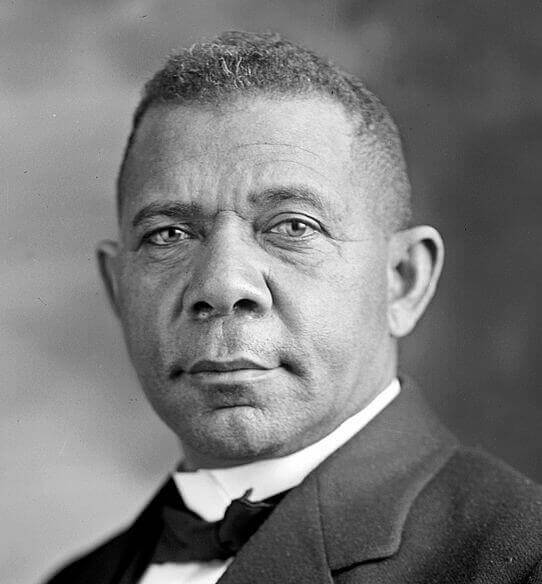Booker T. (short for Taliaferro) Washington was an American author, educator, and prominent leader of the African American community. He was born into slavery as a child, but freed soon thereafter, allowing him to receive an education and eventually teach at a college for blacks. He became a prominent speaker for the African American people.
Booker Taliafereo Washington was born into slavery to a white father (to which he knew very little about) and a black slave mother on April 5 1856. When he was nine years old he was freed from slavery, which was near the end of the Civil War. Washington remembers the day the emancipation notice was read and recalls the following:
” There was more singing in the slave quarters than usual. It was bolder, had more ring, and lasted later into the night. Most of the verses of the plantation songs had some reference to freedom. Some man who seemed to be a stranger (a United States Officer, I presume) made a little speech and then read a rather long paper — the Emancipation Proclamation, I think. After the reading we were told that we were all free, and could go when and where we pleased. My mother, who was standing by my side, leaned over and kissed her children, while tears of joy ran down her cheeks. She explained to us what it all meant, that this was the day for which she had been so long praying, but fearing that she would never live to see it.”
In 1865 Booker moved to West Virginia with his brother John and sister Amanda, along with their mother and stepfather. Book was employed by several different places; a salt packer and miner were among the few which eventually led up to his employment as a houseboy for Viola Ruffner. She had already been through many disappointing houseboys, but Booker turned out to be different. His attention to detail and hard work paid off, and he was encouraged to attend school so he could learn how to read and write. His love for education flourished and he began seeking more education than his community could offer him. He left Malden and enrolled at the Hampton Normal and Agricultural Institute in Hampton, Virginia. He was able to work his way through school by performing unskilled and demeaning tasks but not the hard labor he was used to. In 1878 he went to the Wayland Seminary in Washington D.C. and then returned home to teach school in Hampton, Virginia. It became apparent that Booker T. Washington was a stout teacher and expressed a great love for education. Hampton president Samuel C. Armstrong recommended that he be the first principal of a similar school which would be built in Alabama. This would later be known as Tuskegee University, and Washington would live out the remainder of his life here.
Washington’s Career Endeavors
Early in his career from about1890 to 1915 Washington became a dominant figure in the African American community. He was seen by many as the public spokesman for black people as he represented the last generation of black leaders who had been born into slavery. He was respected by many people and other prominent black educators, ministers, and businessmen. He was also awarded many honorary degrees; many supporters have nicknamed him the “Tuskegee Machine.”
Later in his career he faced some criticism in his approach to civil rights. W.E.B. Du Bois called him “The Great Accommodator” saying that he was not persuasive enough in his arguments against segregation. Washington believed that the best way to avoid a confrontational disaster was to employ cooperative support with whites. He may have been criticized for resigning to undesirable social conditions in the short term, but had his goals set for a much better future for blacks. With his educational background and hard work ethic he obtained the financial support of many philanthropists. It was by way of these wealthy individuals that he was able to fund his campaigns for supporting higher education by building small community schools throughout Hampton. Over 5000 schools were established through his efforts.
A more personal note
Washington was married three times giving all three of his wives due credit for his tireless work, often saying that he would not have been successful without them. He was married to Fannie N. Smith in 1882 and had one child together. She died in May of 1884. He then married Olivia A. Davidson one year later; together they had two sons before she passed away in 1889. His last wife was Margaret James Murray, whom he married in 1893. They had no children together though, and she died in 1925.
Although Washington did much work and traveled a lot, he still remained the principal of Tuskegee until his health began to deteriorate. He died on November 14, 1915 at the age of fifty nine. The cause of death was unclear and could have been from nervous exhaustion and congestive heart failure. In 2006, medical records indicated that he died of hypertension with an extremely high blood pressure.


Leave a Reply